This is an ongoing series. New questions and answers will be added to the blog regularly.
-
Parents of children and young adults with OCD have many questions they’d like to ask their kids about OCD, and we, the members of the Young Adult Special Interest Group, certainly have a number of things we’d like to ask our parents.
In this blog series, young adults with OCD answer some of the most common questions parents or loved ones have based on their own experiences!
-
Disclaimer: all responses are based on personal lived experience rather than clinical training. This blog series is meant to provide insight into what one’s experience with OCD might be like and is in no way intended to serve as professional advice. For professional advice, please seek a trained and licensed clinician.
-
Definitions
SIG: Special Interest Group
Exposure and Response Prevention or ERP: the “gold-standard” treatment for OCD, ERP is a type of cognitive behavioral therapy focused on exposing oneself to thoughts, feelings, or images that provoke anxiety which provoke anxiety and, after triggering this anxiety, not engaging in compensatory or compulsive behaviors.
Acceptance and Commitment Therapy or ACT: a form of cognitive behavioral therapy, sometimes used in conjunction with ERP for OCD, that uses acceptance and mindfulness skills along with behavioral changes to increase psychological flexibility.
Behavioral Activation: a therapy designed for treating mood disorders that encourages engaging in positive and enjoyable activities in order to lift one's mood.
-
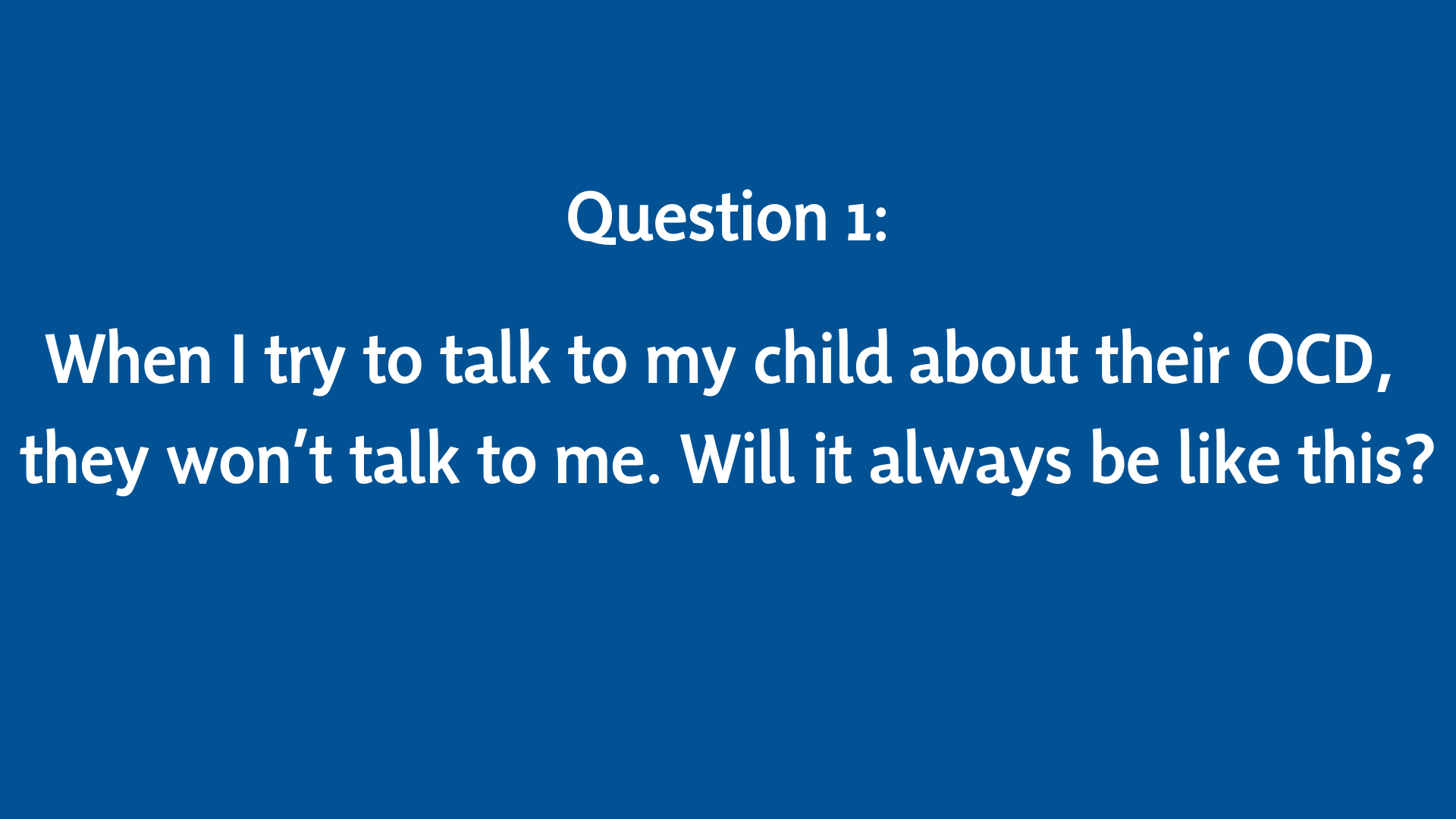
Anonymous: I have two pieces of advice for this:
First, it’s important to understand that there can be a lot of shame involved with OCD. Even young children might know that the compulsions they’re doing are irrational, and that can sometimes make them feel embarrassed - my own compulsive behaviors started when I was about five years old, and I was embarrassed about them even at that age. I unfortunately didn’t see a therapist until later in life, but I think that if I had seen one as a child, it would have helped immensely in dealing with those feelings of shame.
So my first piece of advice is to have your child speak with a therapist who specializes in OCD, if they aren’t already. If you have any way of connecting them with other kids who have OCD, that can be helpful as well. Even in my own experience as an adult connecting with other people who have OCD, I can say it makes a big difference in my self-confidence and comfort in opening up to see that I’m not the only one with this disorder and that what I’m going through is normal.
My second piece of advice is to be patient with your child if they don’t feel comfortable talking about their OCD yet outside of a therapy setting. In my own OCD journey, opening up to people was something I really needed to do at my own pace, when I was ready. And the people I’ve opened up to about it were the ones who I most felt would be nonjudgmental and supportive. You’re already doing the right thing by asking questions through a forum like this, and showing genuine care about what your child is going through. That sort of attitude is something that kids notice and remember, and in my view, will make them be more likely to open up to you about it when they’re ready.
Kyle: The short answer is - certainly not in my case. When my OCD was at its worst, I rarely talked to my parents, especially about OCD. And I think I was so reluctant to speak for a couple reasons. First, living with overwhelming OCD is terrifying and overwhelming and, in the midst of all that, I was just generally irritable. Second, I felt like when my parents tried to talk to me about OCD, they’d most often just point out compulsions and push me to work on them. My OCD didn’t like that and, because my OCD and I were intertwined then, I didn’t like it much either. Probably most importantly, though, I could feel in my parents voice how badly they wanted me to recover so, whenever we spoke about OCD, I just felt like I was letting them down. And that sucked.
As far as advice, despite what I said above, I do think parents should push their kids to do exposures. Or, at least, not let them off the hook if they try to avoid exposures. I’m eternally grateful to my parents for pushing me in that direction. I acknowledge that this is exceptionally hard, to be tough on your kid when they are suffering, but I would not be free from OCD today had it not been for my parents. Also, it would have been nice if my parents started any conversation by letting me know that they had seen me working hard, acknowledge any wins I had had that week, before talking about anything negative. This maybe would have made it all feel less disappointing.
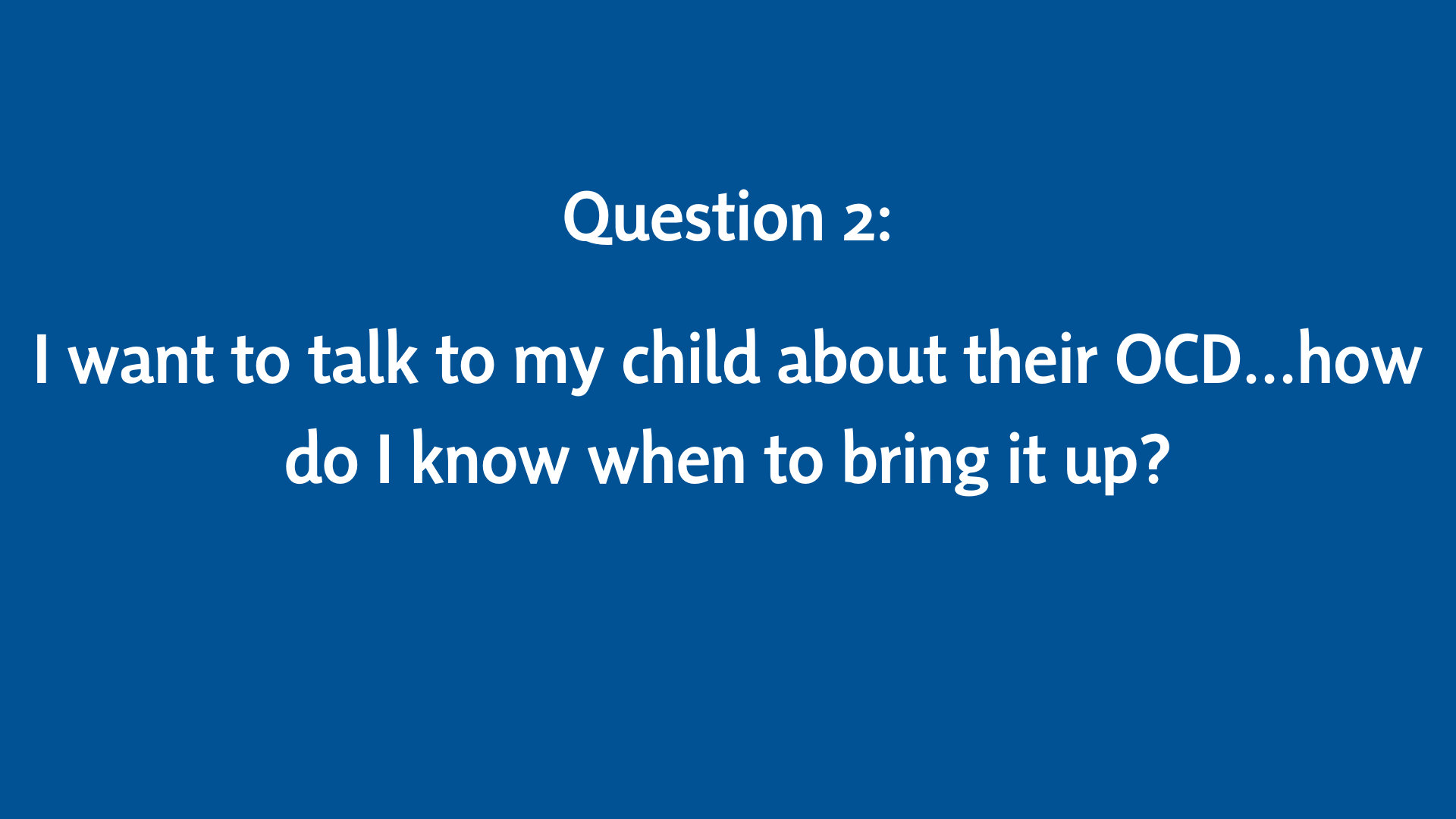
Jacob: Finding an opportunity to discuss OCD can definitely be difficult for a variety of reasons, but it can also be rewarding as it can lead to a better connection. One of the most important things when figuring this out is making sure that it is done in an environment that is comfortable and considerate to those involved so that it can be a productive conversation. As far as when to do so, try a collaborative approach, meaning working with your child to find an appropriate opportunity to do so. Whether that’s planning out a day or time or setting up “meetings” solely dedicated to this discussion, it’s important to arrange any talks such that everyone knows what to expect and when. This also allows for preparation and proper expectation-setting, and places an emphasis on the value of the discussion.
Since this topic can bring about various emotions, I would not suggest trying to talk about it during or shortly after particularly distressing times or episodes of ruminations and compulsions. For me, I know that I did not like to be “interrupted”, and although it’s not great to encourage or “work-around” the compulsions, these were not times where I was necessarily open to change or in an emotional state where the discussion would be productive. Immediately after performing a compulsion, I simply wanted to avoid the topic of OCD, thus making any conversation unproductive even if it seemed like I was “open to a discussion”. Lastly, as much as planning a discussion can be beneficial, it’s also important to be cognizant of if the conversation becomes unproductive and be open to agreeing to adjust or find another opportunity as needed.
Kyle: For me, when to bring it up was complicated. And that’s mostly because when never felt like it came.
When my OCD was most severe, I never wanted to talk about it with my parents. I never wanted to talk about precisely what was going on in therapy, at school, or in my head for what I think are two main reasons: shame and fear. On shame, I always would avoid talking to my parents about OCD because speaking about it always made me feel like a failure. Our conversations always reminded me of all the things I wasn’t able to touch, all the exposures I wasn’t doing and, to some extent, all the ways I was letting my parents down. And that feeling persisted despite them explicitly telling me time and time again that they were not ashamed of me or disappointed in my effort in treatment - the shame was something insidious that no one but myself could address. On fear, I was also scared to talk to my parents about OCD because they pushed me to do exposures. Here is where it gets a little complicated. I, when my OCD was most powerful, did not want to confront it, thus I got upset and defensive and anxious when my parents encouraged me to do just this confronting. I say this part is complicated, though, because, in hindsight, I’m incredibly grateful to my parents for pushing me despite having been upset in the moment. I wouldn’t have recovered without them.
So, when to talk with your kid? Well, because talking to me was like pulling teeth, my parents and I set up a system where for 15 minutes a week, on Monday nights, we would talk about OCD. They could ask whatever questions they had and I had to fully answer. And outside of these 15 minutes, we wouldn’t talk about OCD. In this way, we reached some sort of compromise in which my parents got the information they needed, without a full-scale meltdown on my end (at least, not most of the time).
Anonymous: From my experience, there really was no “right” time to bring up OCD. As a young adult who has undergone lots of treatment, I can attest to the importance of communication and support from loved ones. When my parents approached me about the OCD, it was a relief to know that they were there to listen and help me through it. So my recommendation would be to trust your instincts as a parent and create a safe space for your child to express their thoughts and feelings to the extent they feel comfortable with. I was very open with my parents about many of my obsessions and compulsions but I know lots of others aren’t as open and that’s completely okay!
An important thing to note is that I would never discuss it when my anxiety was heightened. It wasn't the best time because my brain was so focused on what OCD was telling me that I couldn’t focus on the conversation my parents were having with me. Initiating the conversation with empathy and understanding will hopefully provide invaluable support on your child's journey toward freedom from their OCD!
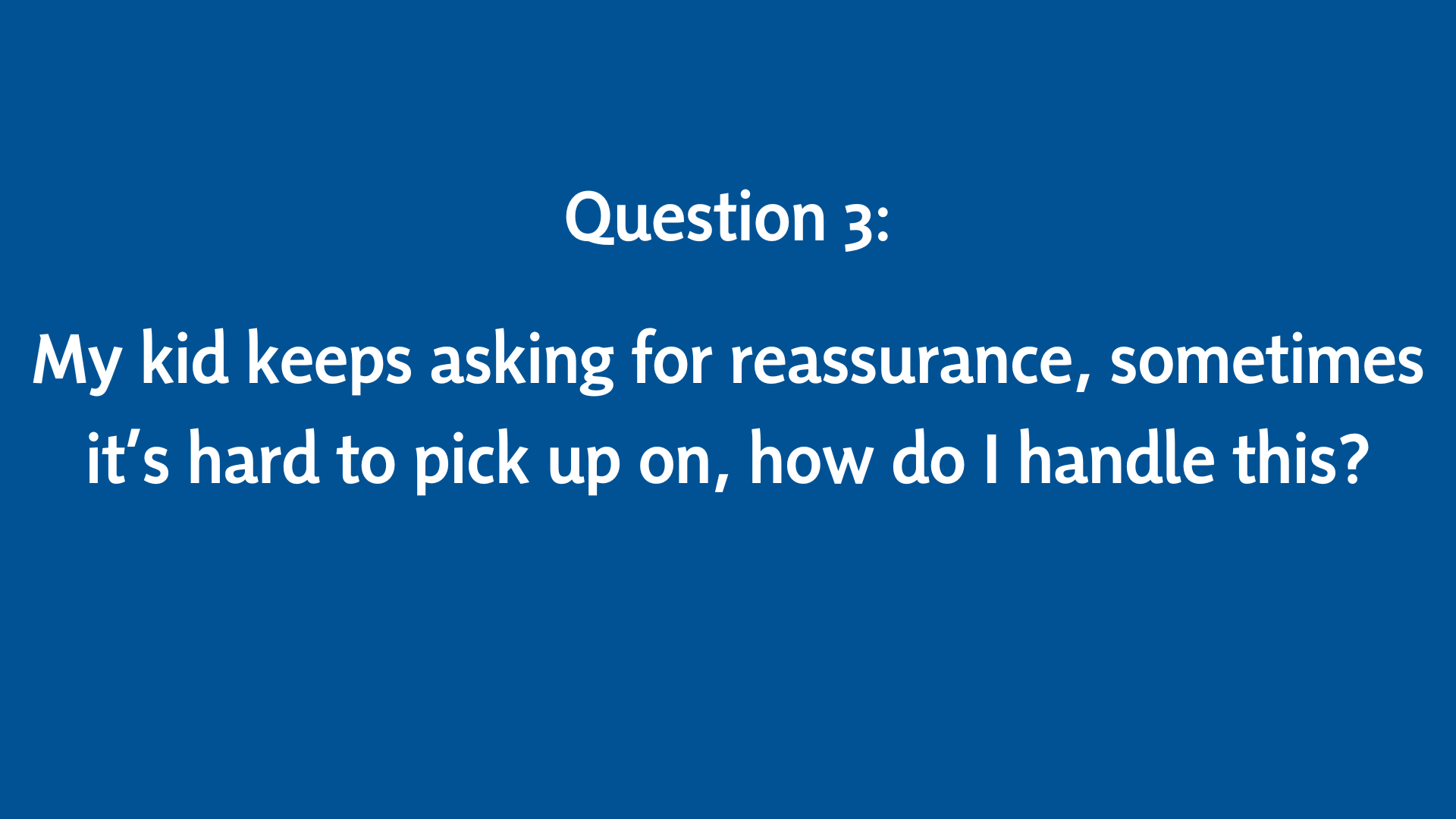
Jacob: It’s worth stating that you want to limit reassurance. As reassurance-seeking can be quite sneaky, having to put your detective hat on as a parent to figure it out sometimes is important. Creative minds find creative ways around being obvious about reassurance seeking. For me, the main goal of reassurance was to obtain a “feeling” of comfort or satisfaction. With that in mind, I would suggest looking out for patterns in your child’s reaction to your responses. If there is a sudden change in attitude or demeanor, or inquiries, simply stop during a series of questions, these could be indicators that the child experienced some level of reassurance from your response. Desiring reassurance is often accompanied by the feeling of urgency, so if questions are asked in a time-sensitive manner or the interaction feels pressing, this again could be reassurance. Since it can be difficult to notice, it’s also worth asking your child if they are seeking reassurance with their questions, so that you can start to develop a better awareness. Something my parents would do is ask me what I think when I ask them a question. I didn’t like this because it was not what I wanted to hear, but it refocused my mind from fears or worries to reality and known truths in front of me, overall working to try to reframe my approach to the thoughts. Also, give yourself grace and compassion. We can be tricky and you’re not going to notice it all the time. Nobody’s perfect, as much as we may want to strive for it.
Anonymous: Just to make it clear, reassurance is just like another compulsion, which is why it's so important not to fall for it. It reinforces the OCD cycle. Luckily, there are ways to respond to reassurance-seeking questions that don’t provide any certainty and, in so doing, fight against reassurance. For example, instead of saying to your kid, 'That's not contaminated, it's clean, I'm 100% sure,' I found it helpful when my parents said things such as 'I know you are feeling some strong emotions, can you name them?' or 'I know you want reassurance about that, but we really don't know’ or ‘We can try something different this time, like not washing your hands.' Always communicate with compassion and empathy. Remember, sometimes kids will get frustrated with these types of answers, and they may engage in their compulsions. It's okay. No one has to (or will) progress through treatment perfectly - what matters is a general trend towards health!
Anonymous: In my personal journey, I went through many different stages of reassurance-seeking with my parents. At first, all my reassurance questions sounded like completely normal questions one would ask. My parents answered every question I would throw at them because they weren’t aware that the more reassurance I receive, the more likely I will be to ask more reassurance questions and the cycle will continue. It got to a point where these reassurance questions just consumed the entire day and my parents would keep answering the questions because they felt that they had no other choice to get through the day. After my parent’s received the psychoeducation about reassurance, they began to learn that they can tolerate the stress of not constantly giving reassurance knowing that it is helping their child find freedom from their OCD. Once my parents learned the basics of reassurance-seeking, their eyes and ears became more open to common reassurance-seeking questions.
The toughest part is the response to reassurance-seeking. In my journey, there was definitely a certain limit in the amount of types my parents were able to use certain responses, because I caught onto their answers, so it was important for them to switch it up.
The big two responses that I remember my parents using with me were, “I know this is OCD talking to me right now so I am not going to answer that question,” and then putting it back on me where they asked, “Is this a reassurance question?”
The most important thing to remember is that this is not easy for you or your child and you are all putting in the hard work. You both are doing what you can to gain freedom from OCD and always remember that there is hope!
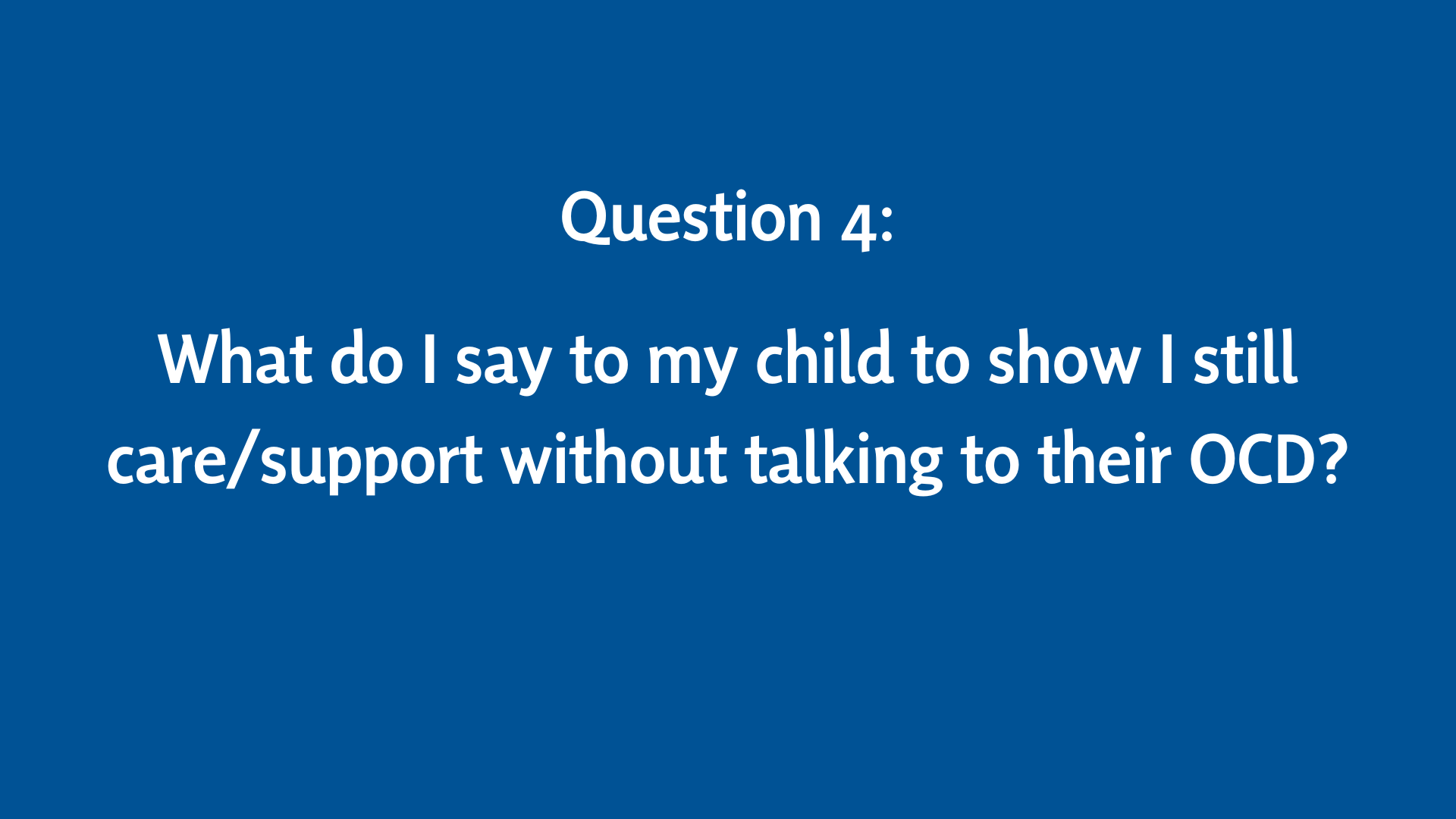
Danish: OCD is extremely distressing. It was utterly debilitating for me. It led to sudden changes in my mood, and this instability had a profound effect on the people around me, particularly the family members I lived with. What kept our family afloat during these difficult times was my loved ones’ empathy for my condition. They understood that I would be in immense pain during certain periods of my treatment and they learned to give me the space I needed during those moments to process my emotions. Initially, they had the intuition to engage with my OCD, often through reassurance and logic, to help me get better, but the greatest help was giving me the space to ride through the messiness of ERP (exposure and response prevention).
But how should I do that? What if I say something that feeds my child’s OCD? As I have alluded to in other blogs, I believe showing empathy is the best approach. Affirming your child’s negative emotions by saying the most simple of things like “That sounds awful, I can’t imagine how hard it is” can go a long way. You do not need to engage with their OCD, you just need to be there for your child. In the case that your child is actively asking you for reassurance you can still reply with love and care. For example, you can say, “I love you, and because I want the best for you I will not answer your question/give you reassurance.”
Layla: It’s important for parents to recognize that even though OCD may look illogical and be hard to understand from the outside, the feelings it brings up are very real. Your child may experience many emotions—from anxiety to loneliness— as they learn more about their diagnosis, enter or adjust to treatment, and begin to challenge the thoughts and urges that are often so loud in their head. For me, I appreciate when people acknowledge my feelings, even if they do not engage with the content of my obsessions. You might say something like “I see that you are really hurting / afraid / angry / grieving right now. I am sorry this process is so difficult” or “It makes sense that you feel this way.”
Additionally, having a conversation with your child when they are not in an escalated state about how you can best support them in high-stress moments or after exposures can be helpful. Maybe they would appreciate having you by their side while they are upset or maybe there are tools you could bring to help them regulate, such as a cold beverage or activity. Discussing strategies for supporting your child with a therapist will help you ensure that you are not unintentionally feeding the OCD cycle. Overall, the best ways you can respond to your child are with compassion and empathy, focusing on their feelings rather than the content of their OCD fears. Continue to educate yourself on OCD and make an effort to understand what they’re going through. Let them know that you are there to love and support them, and that sometimes looks like not complying with their OCD. For instance, if they come to you asking for reassurance that they are a good person, you might say, “It sounds like this might be your OCD talking, so I’m not going to answer that question. But I understand that you are stressed or upset, and that’s okay. We can share those feelings together if you want to tell me about them.” Here, you gently identify the compulsion and practice non-engagement, while still giving your child a safe space to express the challenging emotions they’re facing.
Emily: In my experience within my own family and peers, having someone acknowledge that they understand my struggle means so much to me. It is a way of validating without reassuring. Sometimes when I find myself really struggling and I am stuck on one thought or obsession in particular, I have tunnel vision. My mom can usually sense this. She always says to me something like, “Emily, I know this is hard, and I know this feels real. Remember what OCD does to you and how you have to sit in this discomfort. Remember that this discomfort does not equal danger.” Being educated enough on OCD to be able to talk to your child in ways that would not contribute to their OCD is crucial in supporting them.
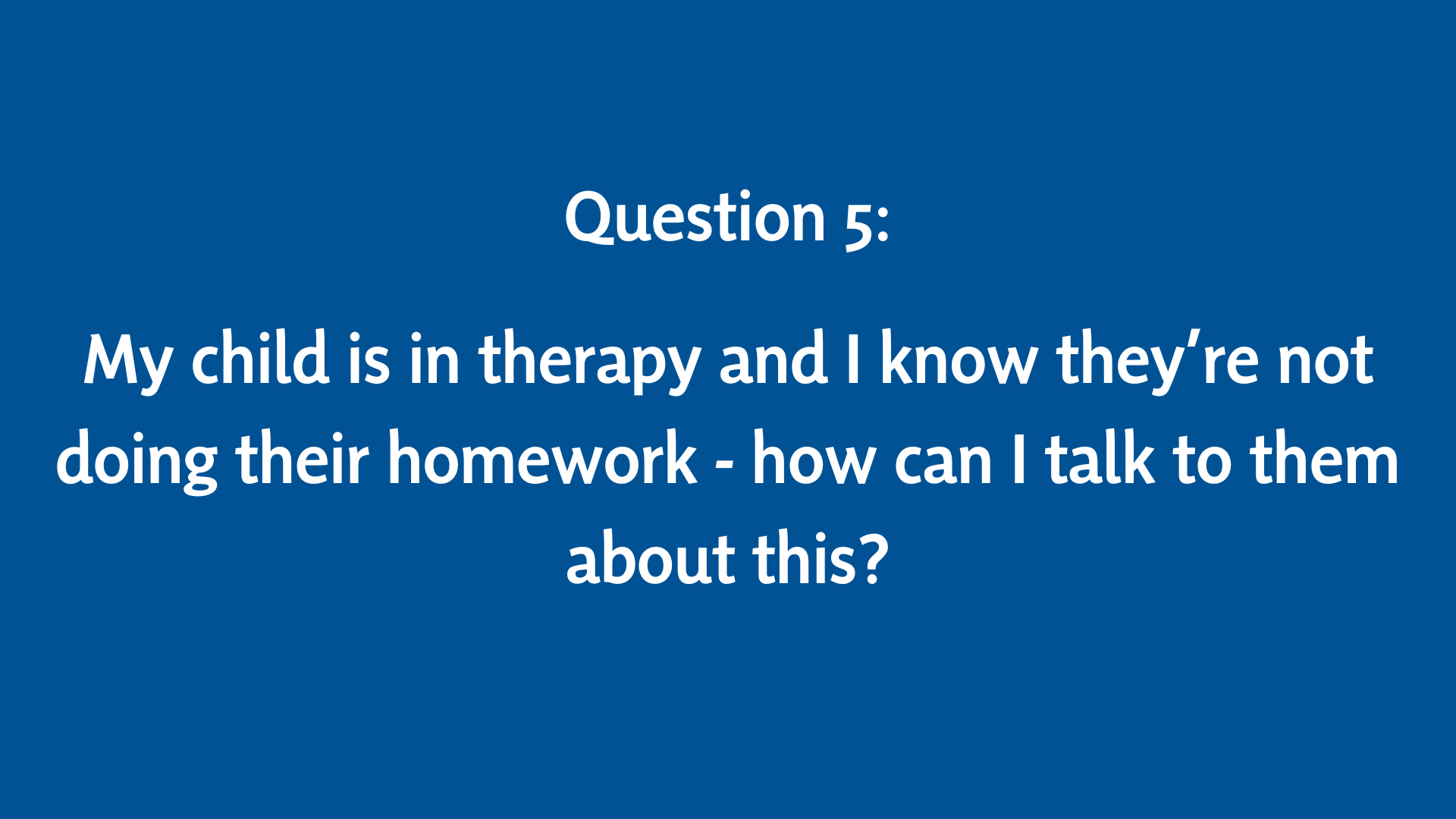
Layla: This is definitely a challenging situation, both for you and your child. Personally, avoidance is one of my biggest compulsions, and it did (and still does!) affect my treatment journey. Even though I know logically that doing exposures and practicing techniques like urge surfing, response prevention, and behavioral activation are the ways to get better, that doesn’t make them less intimidating or more comfortable. Few people would choose to set aside an hour to deliberately engage in a panic-inducing exercise. That being said, it is also hard for you to watch your child continue suffering from a debilitating disorder while avoiding the treatments that will help lessen their symptoms. It is important that you acknowledge that ERP can be really hard and by definition will cause anxiety; even exposures targeting lower-level fears can cause high levels of distress for your child. Approach any conversation about their engagement with treatment with compassion. Have a discussion to see if there are any specific barriers they are facing with their therapy homework. I sometimes avoided exposures because I didn’t know where to fit it into my schedule; they may need help identifying a time where they can do the exercise and have time to get regulated again before returning to academic or social responsibilities. Other times I did not do exposures because I felt like I would not be able to calm down afterwards; if this is the case, having a plan to do something relaxing or engage in an activity that aligns with their values might be helpful. It may also be helpful to discuss your level of involvement in their treatment; checking in with them daily or every few days about their assigned exercises may add a level of accountability, but it may also be frustrating for your child. Being forgiving and understanding that they may not feel 100% after doing their homework is important. Celebrating when they do complete their therapy exercises and identifying small victories throughout treatment can help them feel encouraged and supported.
Sidney: I think starting off the conversation with a gentle and curious tone is the best approach. Try not to be accusatory, upset, or authoritative when broaching the subject with your loved one. To show your support and understanding and hopefully help cultivate a space where your child feels open to talking to you about this, try something along the lines of : “Hey I noticed you haven’t been doing your therapy homework. I know it can be really difficult to do and to even talk about. If you are open to it I would really love to talk to you about this and maybe see what’s preventing you from doing your homework. I’m not mad or upset, I just would like to understand to see if there’s some way I can help or support you.” Sometimes, kids (of any age!) won’t want to talk about their homework. A lot of shame can come up with this issue, perhaps your child feels they aren’t “doing enough in therapy” or “aren’t good enough”. Shame can manifest in different ways, ranging from avoidance to anger. Approaching this conversation causally, lovingly, and respectfully might help. Another tactic is giving your child more control over the situation; let them know you would like to talk with them about this and ask when would be a good time for you to have this conversation.
Ashley: I would remind them that even though the therapy and homework is SO scary, it is so so so worth it. Doing their homework is what will help them get better, and eventually you will have to do it at some point, so why not now? The more you do your homework, the easier it will eventually become. With my lived experience, I have never regretted doing any homework, and I am SO happy that I did it.
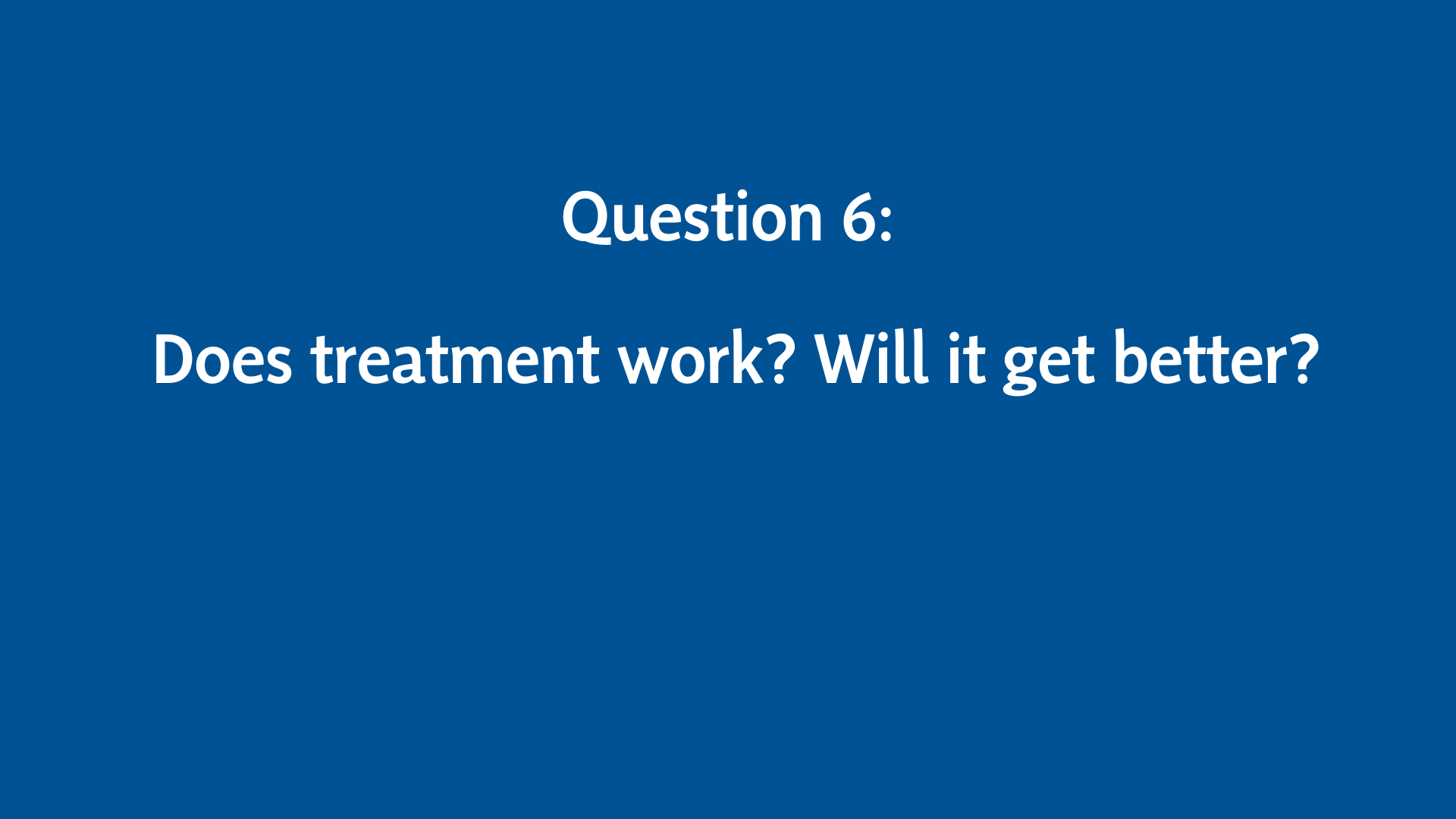
Kate: I sometimes have a hard time remembering the darkest days of OCD when my life was so small and all consumed by obsessions and compulsions. Taking the leap into treatment was absolutely terrifying, but there felt like no other option since the status quo was so far from what I considered life. I now write this as a medical student who still very much has OCD, but it does not define my life by any means. I still take medication and go to therapy biweekly and consciously do exposures, but resisting OCD has certainly become easier. I still go through difficult periods with my mental health but I know that those darkest moments are exactly that—moments. Having seen how full life can be when you let your values dictate your life rather than OCD motivates me in those moments to keep on using the tools I have gained through treatment to continue pushing ahead—even when it feels scary.
Emily: Based on my experience, Treatment absolutely works. As always, every human body and brain is different. Someone's OCD journey to recovery may take longer than others. Some people have a harder time finding the correct treatment, or sticking to the treatment plan. OCD makes it scary to think about the future, as it is so uncertain. Many of our thoughts create a future we are scared of. Sitting in that uncertainty is crucial in the recovery journey. Many of us are living proof that it does in fact get better. We all have lapses that create a world in which we feel isolated or scared, but a lapse does not mean you are stuck. There is a light at the end of the tunnel, you just have to keep working to find it.
Jessie: 100%! My life looks completely different now than when I was at my worst struggling with OCD. In treatment, you/your child will learn the tools to fight against their OCD and, over time, it will get smaller and smaller. It takes a lot of hard work, but with bravery, strength, and resilience, it absolutely gets better.
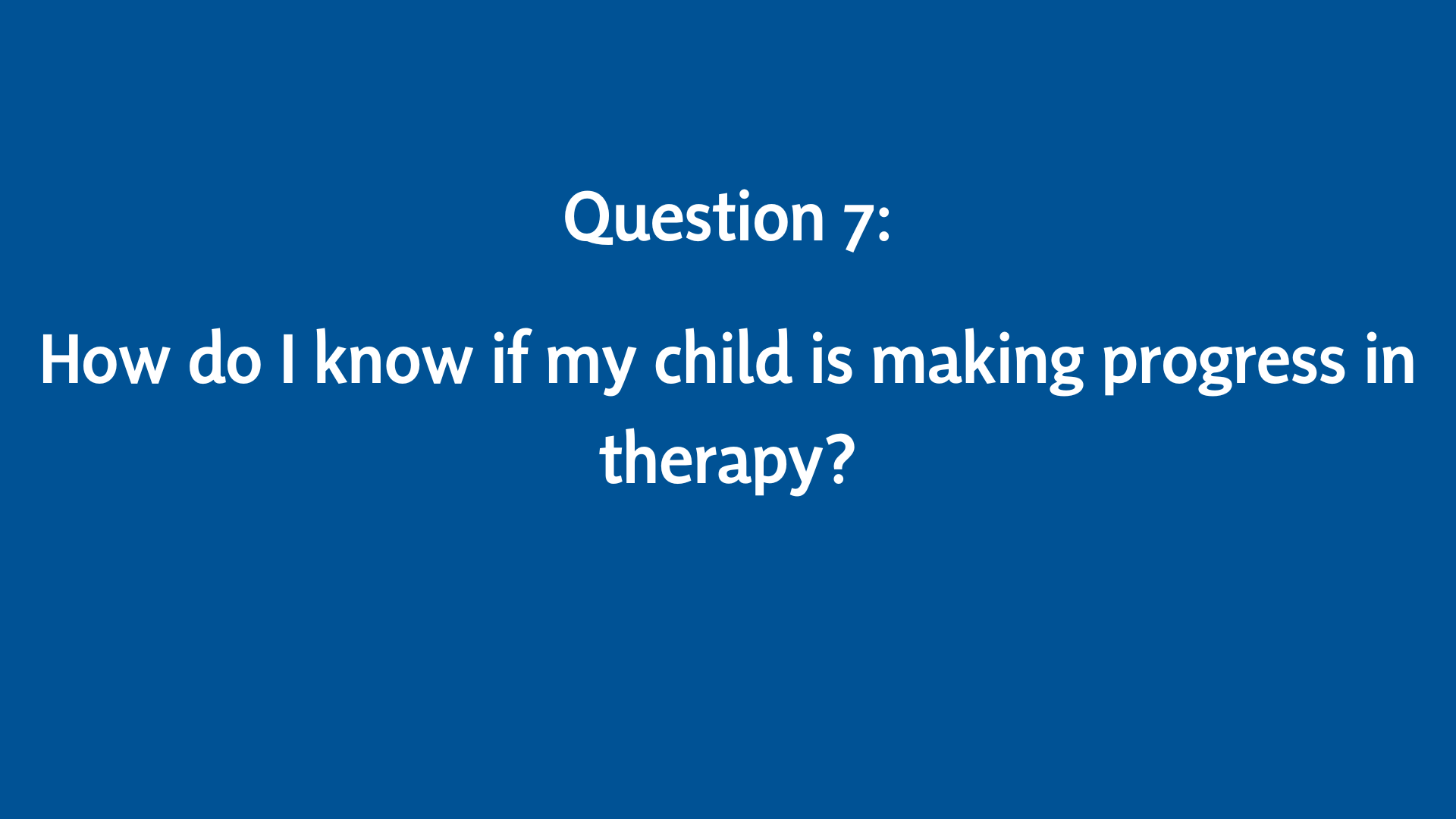
Layla: What progress looks like will vary from child to child, and everyone has a different timeline for treatment. If your child deals primarily with physical compulsions, their progress may mean they are able to delay their compulsions for longer or that they are spending less time doing compulsions each day. For children dealing with mental compulsions, it may be more difficult to identify progress, but there are still ways to see. They may have less frequent emotional outbursts related to OCD triggers or their obsessions or be able to regulate themselves more quickly. They might appear more present in everyday situations, with their mind not otherwise occupied with rituals like counting, thought suppression, or list-making. You can also chat with your child about what they are learning in therapy if they are willing to talk about it. Maintaining an open line of communication with their mental health team is another valuable tool, as your child’s therapist can give you more specific areas to look for progress.
Sidney: If your child is open to talking about their OCD and treatment, I would say just ask! I would make sure to ask in a curious way that reflects that you aren’t pressuring them to “get better quickly” but care more about them and their treatment and are curious about how it’s going. If your kid isn’t normally open about their treatment, it might not be as simple as asking them about their progress. Seeing progress will be different for each kid, as some might have a visible reduction of compulsions, while others have mental compulsions that were never visible to begin with. Progress might look like an increase in doing certain activities that they previously avoided, more time spent doing things they enjoy instead of compulsions, or an overall uplift in your child’s mood. I think it can be hard to tell if your child is making progress - at times, even those with OCD can feel it’s difficult to gauge how much progress they’ve made. My last thought is that although it’s difficult, sometimes, as parents, it's beneficial to practice “sitting with uncertainty” as well. You might not always be able to tell what’s going on with your kid, if they are/aren’t making progress, or if your kid will ever be more open about their OCD. Trust yourself that whatever is happening, you can handle it and find new ways to adapt to your situation.
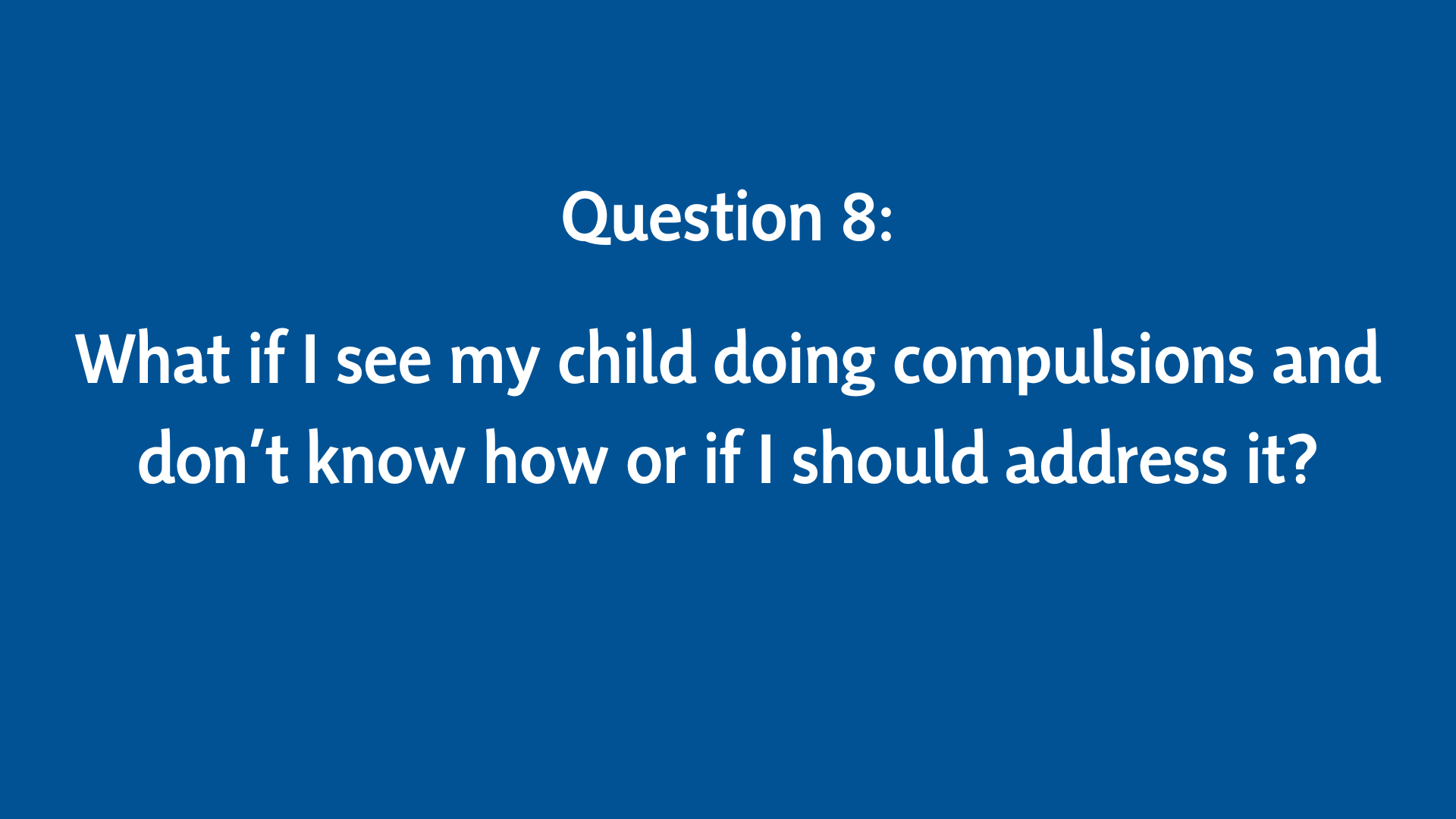
Jacob: If they have yet to be diagnosed, there is not really an awareness of OCD yet, and you believe that you are recognizing compulsions, you may be able to address it by saying something like “I’ve noticed…[insert compulsion]...would you like to talk about this, or what you’re feeling?” The goal here is to gather more information to see what next steps may be warranted, and it could be valuable to address it in order for them to receive the proper treatment. On the other hand, if everyone is aware that it’s OCD, similar to when trying to figure out when to discuss it with your child, it's important to make sure that it is done so appropriately and without judgment and that the conversation is collaborative. If you have found an opportunity to discuss it with your child, be compassionate. Depending on where your child is in their treatment, it may not always be necessary to address it. For me there was a lot of shame associated with having OCD, and I didn’t need for it to be “pointed out” every time, especially in the moment. I had a good awareness of what it was and that doing the compulsions wasn’t truly necessary, but it still felt real, and addressing it only further emphasized that I was struggling. Anecdotally, I have heard that this awareness is common. If the compulsions are destructive or it seems more pressing that they should be addressed, outlining their impact and how it makes you feel may be important to provide a new or outside perspective, as your well-being matters also. To me, agreeing upon a collaborative approach seems most productive.
Kyle: My parents never intervened on a compulsion of mine when it was in progress (i.e. they never cut off the water supply to stop me from washing my hands). Just my perspective, I found this helpful. It made it increasingly clear that it was up to me, no one else, to overcome this disorder, and that sense of personal responsibility made me more invested in each exposure.
That said, they certainly made clear that they saw the compulsions go on. They would tell me, in moments of quiet, that they saw me washing my hands or taking a Lysol wipe to my backpack and I think, to some extent, this was helpful. It certainly would not have been helpful if they had called out each and every compulsion, but it was helpful for them to occasionally remind me that, next time before I start any such compulsion, I do indeed have a choice. And that next time, I might choose to fight OCD.
So, as far as if you should address compulsions is concerned - I think yes, but maybe not during. When it comes to how, I really appreciated my parents lightly reminding me that, although I chose to listen to OCD that last time, there would be a next time and, in this next time, I could choose life over OCD.
Ashley: When I found it really hard to stop doing compulsions, I would often remind myself about some facts about OCD - these facts may be nice things to remind your child of. I would remind myself that my OCD just wanted control, and anything that it threw at me was just its attempt at getting as much control as it could over me. I would also tell myself that the only way I could get stronger over my OCD is if I didn’t give in to it and didn’t do the compulsions it would tell me to do.
Reminding myself that giving into my OCD and doing the compulsions is what it wants me to do, and is only going to give it more power and control over me helped me stay focused. As such, it might be a good thing to remind your child of.

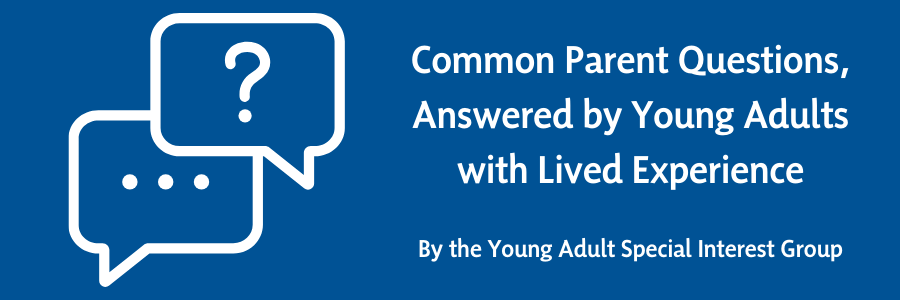
Excelente recomendación
thank you! That was helpful
Wonderful!
Thank you all! This is very helpful information. I appreciate you sharing your experiences